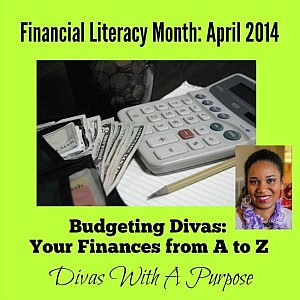Organization and Your Finances
 Organization is today’s topic for Financial Literacy Month 2014: Your Finances from A to Z.
Organization is today’s topic for Financial Literacy Month 2014: Your Finances from A to Z.
For the month of April, we will be bringing you daily posts centered on our personal finances – saving, making and managing our money.
Organization Can Help Save You Money
As we grew up and moved out of the nest, it may have been tempting to let tidiness and organization go out the window. The truth is, being messy can cost us money!
Good organization is the keystone to making and saving money and if you want to do either, you’ll find that you can easily make some progress by organizing your life.
Schedule Your Bills
The first expenses you have to worry about each month are your household bills like the rent or mortgage and utilities. It’s all the more reason to be organized so you can manage your money to pay these on time each month.
- Use a calendar, planner, computer program, or online banking account to schedule when your bills need to be paid. Any delay can cost you substantial late fees and finance charges.
- If you set up electronic banking, make sure you understand exactly how the system works. Some programs will not allow you to make a payment on weekends or holidays while others may need a few days to process the payment.
- Pay your taxes on time or early. Penalties as well as late charges are added if you don’t file the proper extensions. Hire an accountant to help with your preparation, especially if you work independently.
- If you work independently, you may also want to consider paying your taxes quarterly so you don’t have to worry about them at the end of the year.
Organize Your Paperwork
All of your paperwork should be organized so you know exactly where your receipts, financial statements, and bills are filed. There’s nothing worse than going in search of a needle in a haystack when a question arises.
- Everyday take a look at your desk area and think about what pieces of paper you can immediately get rid of. A wastebasket by your desk is essential, as is a shredder to prevent identity theft.
- Utilize file folders or a portable file container instead of having piles of papers on your desk or countertops. This will prevent you from losing important pieces of paperwork under a landslide of unimportant junk.
Consult with a Financial Advisor
Whether you have a substantial investment portfolio or just want to get started, consult with an expert who can help you reach your financial goals. By organizing your finances, you’ll not only save money, but make it too!
- If your current investments aren’t performing well, an advisor can help you move the money around to better performing funds that earn a higher yield or give you greater dividends.
- If you don’t have any investments, an expert can listen to your financial goals and recommend an investment plan for achieving those goals. Even starting off modestly will often bring you some annual dividends. Every little bit helps!
Consolidate Your Debts
Get in control of your money by consolidating large debts with one loan. Research which banks or credit cards will give you the lowest interest rates and consolidate your payments into one. This will save you money by paying fewer interest fees, but you must also limit your spending until the debts are paid off.
- Ask a mortgage broker about refinancing your home or taking out a home equity loan to consolidate debts.
Be in control of your money and your life by evaluating your accounts regularly and staying organized. A little bit of work each day and regularly monitoring your progress will help you reach your financial goals.
